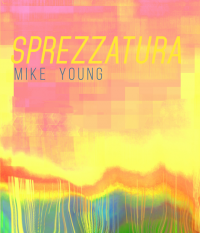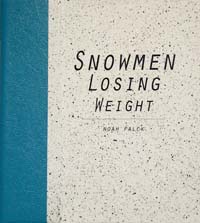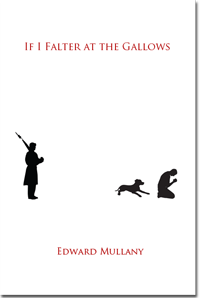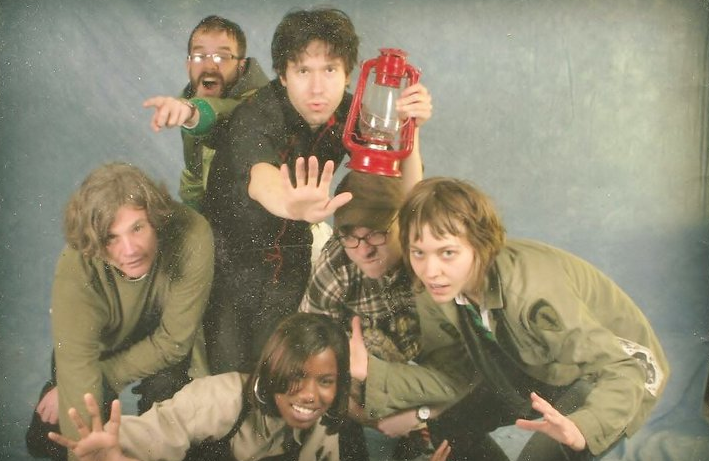25 Points: Sprezzatura
 |
Sprezzatura
by Mike Young
Publishing Genius Press, 2014
132 pages / $14.95 buy from Publishing Genius
|
1. Deep down he thinks he’s too much of a redneck to have got into Husker Du.
2. Syntax 1: His syntax is fascinating. Someone – can’t remember who – once said that ‘a poem should be a machine for re-reading’ and that’s what you do here. You read, you skate across the surface and then you re-read and it’s different the next time and you can’t get bored.
3. Syntax 2: Because of this, it sometimes seems like he’s put a real long scroll of paper into a typewriter emulator and just kept on Benzedrine-typing until he was finished.
4. Don’t get carried away with the Benzedrine though. There’s something else going on here:
“Often I throw a tennis ball against the wall and hope
the people downstairs believe more people exist
above them than really do…”
There’s a bit of craft at work here. Don’t get carried away with the Benzedrine. This isn’t just typing.
5. ‘On the bus, I pass through unobtainable wi-fi’ might be one of the best lines I’ve heard to sum up now, right now.
6. There are things here in this book. Things everywhere. Nouns.
7. There are unfashionable adjectives with fashionable nouns and fashionable nouns with unfashionable adjectives everywhere here.
8. Mike Young is a poetic phrase-maker in a way you don’t see too much in contemporary literature/Alt-Lit etc. He’s bringing phrase making back and making it cool.
9. I want to make a phrase now but you know you can’t just make a phrase just out of the blue as easy as you might think, it’s hard. If you plan it too much and try to think of a noun and an adjective and put them together the only noun you end up thinking of it ‘sea’ and the only adjective is ‘blue’ (or if you’re feeling revolutionary ‘green’) and that was all well and good 700 years ago but now it’s just some blue or green sea that isn’t even good enough for a corporate advertising slogan advertising shower gel let alone a book of writing/poems. So, it’s hard making phrases. It’s an art form. It’s easier to consciously make a bad one. This book is full of none-bad phrases. Here’s some:
10. ‘…imported mango soda’
October 20th, 2014 / 12:09 pm
Dressing Up Seth Oelbaum
[I was going to post something else entirely today—something light and fun—but I ran into some technical issues, and in any case this past weekend’s comments and page views indicate y’all would rather talk about Seth Oelbaum. So let’s talk more about Seth Oelbaum! As well as talking about Seth Oelbaum.]
Mike Meginnis’s recent post, and his follow-up comments below, clearly express his desire to pronounce some final word on “the Seth Oelbaum question” (as Reynard Seifert so cleverly phrased it), and put it all behind us. I have the highest respect for Mike as a writer and as a friend, and I understand his frustration, but I don’t think critique works that way, or should ever work that way. The price of being able to criticize is constant reappraisal, and not being able to declare conversations over.
In my comments on Seth’s last post (here, here, & here), I stated my concern that I’d said all I had to say about his writing here, was starting to repeat myself. But Mike’s post and the ensuing conversation caused me to return to certain aspects of it, and think up some new thoughts. (Surprising, I know, that I would find I had more to say.) So this is my attempt to lay out my thinking as clearly as I can. I hope you’ll add your own thoughts in the comments section below, if so inclined.
First, let’s agree that Seth’s writing is (perhaps deliberately?) somewhat inscrutable. Seth’s penchant for opacity hasn’t made it easy for people to figure out what he’s up to, even as near everyone agrees that the writing is offensive. Seth has also demonstrated little willingness to engage directly and openly with his growing ranks of critics, preferring instead to double down on his shtick.
I’ve read everything Seth has posted here (multiple times), and many of his posts at Bambi Muse, and a fair amount of his poetry. (Peter Jurmu just gave me a copy of Artifice #5, which contains some sonnets by Seth.) And while I certainly may be wrong in my interpretation, I think I understand part of what Seth is up to. (I’ve said some of this already, but please bear with me.) Forced to summarize, I’d say that Seth is appalled by how the suffering of certain people is privileged over the suffering of others. Thus he was enraged when the US media devoted extensive coverage to the Boston bombings, while it has remained relatively silent regarding the ongoing bomb-heavy conflict in Syria. He’s also enraged when Hollywood regards the Holocaust as an atrocity the Nazis did exclusively to the Jews, ignoring the simultaneous slaughter of the disabled, homosexuals, the Roma, among many others.
If this is indeed Seth’s point, then I don’t find it controversial; nor, I imagine, would you (at least in general—let’s acknowledge that Seth is not one for finer details). If one opposes massacres, then one should oppose all massacres. As such, the US media deserves criticism for privileging certain ones over others. Similarly, we ourselves are at fault when we disregard the suffering of others. We would do well to wonder how and why the world got to be like this, and what we can do to change it.
Meanwhile, we might also say: “Seth Oelbaum, you’re barking up the wrong blog! We’ve already read Karl Marx and Hannah Arendt and Noam Chomsky, and we know what you’re trying to say and already agree with you (even if we find repulsive your way of putting it)! Go post at Little Green Footballs or some other conservative blog, or at least change your shtick to acknowledge that we’re not the audience you’ve mistakenly judged us to be!”
The problem, however, is that this is not the entirety of Seth’s message. The fact that Seth keeps posting here—doubling down—indicates that Seth does not believe that we are “the wrong audience.” Furthermore, from what I’ve heard (and this is hearsay, but I’m inclined for now to believe it), “Seth is always like this”—anywhere he goes, anytime of the day, he’s always “on.” Seth has responded to total war with total abhorrence to war. And while that might not make him the most charming dinner companion (or party guest, as Mike put it), it does suggest a bit more about his motivations. Because I think Seth’s primary goal is to make other people suffer.
Noah Falck’s Snowmen Losing Weight
 Snowmen Losing Weight
Snowmen Losing Weight
by Noah Falck
BatCat Press, 2012
61 pages / $30 Buy from BatCat Press
Not everybody notices you change. Most of the people, they say hey and start telling you about the bicyclist they killed on the way to work or the pistachio jelly bean they invented in their nap. It takes a special kind of person to point out your haircut. Your weight loss, your new fannypack, your sacrifice flys, your hiccups, the stains on your coat from a watermelon and peanut butter sandwich. And beyond that, it’s a rare bird who will say the soft thing about what they notice. Or will take you as you are into a noticing beyond you both.
Noah Falck’s debut poetry collection, Snowmen Losing Weight, comes with puffy eyes and melancholy jokes, but its realest strength is in its pointer finger. Which is pointed not out of judgment or self-congratulation or even to cocoon two observers against the rest of the cold world (OK, well, more on that later), but to be on the lookout, most always, for a wider circle. Measuring tape that goes forever and is always restarting. Or like it says in the very first poem: “Suppose the wind falls / in love with the wrong / season.” A goal of reckless inclusion, including until we’re out of breath, toward a large and dissolving inhabitance.
First, though: I’m not the world’s waxiest book object dude, but yeah, the physicality of this book is too immediate and elegant not to begin with. Snowmen Losing Weight is four-books-in-one, sectioned out in a double-burger dos-à-dos style. Don’t take my word for it:
I don’t want to compete with a video’s description prowess, but I do want to add two things. One, there’s a real formica nostalgia to the vinyl exterior, like I’m six and trying to find everything I dropped under all the kitchen tables I’ve ever seen. Which is further confirmed by the white-and-black speckling on the cover (inverted on the endpages), which I’m going to go ahead and admit reminds me of cookies and cream ice cream. That was the second thing. The important thing: mad props to the students of Lincoln Park Performing Arts Charter School in Midland, PA, who design and produce BatCat’s books. They’ve done something beautiful and memorable. It’s an expensive book, but that’s because you’ll want to put it where everyone can see it and coo.
November 23rd, 2012 / 12:00 pm
Theory of Prose & better writing (ctd): The New Sincerity, Tao Lin, & “differential perceptions”
In the first post in this series, I outlined Viktor Shklovsky’s fundamental concepts of device (priem) and defamiliarization (ostranenie) as presented in the first chapter of Theory of Prose, “Art as Device.” This time around, I’d like to look at the start of Chapter 2 and try applying it to contemporary writing (specifically to the New Sincerity). As before, I’m proposing that one can actually use the principles of Russian Formalism to become a better writer and a better critic.
If I Falter at the Gallows
 If I Falter at the Gallows
If I Falter at the Gallows
by Edward Mullany
Publishing Genius Press, October 2011
84 pages / $10 Buy from Publishing Genius
Once on Facebook a friend shared the shortest horror story in the world. Just like Facebook, this story involves the awkwardness of when too many people exist in your situation. Maybe let’s say “involves” in the same way somebody says “Hey, Ed, get over here, what do you think?” And Ed tries to say “No, no, I don’t want to get involved.” In any event, the shortest horror story in the world, supposedly, was written by Frederic Brown: “The last man on Earth sat alone in a room. There was a knock on the door.” Note there’s no “then” before “there.” The world is basically the intrusion of the world. This presents the endless and (sure) terrifying awkwardness of simultaneity, which causes me to say I actually think Ed should get involved, if we’re talking terror, and by Ed we’re talking Edward Mullany, author of If I Falter at the Gallows, a book of barely unchoked poems, arrangements of scene and confession that scalpel the world like a goth kid who grew up to be a jeweler.
January 27th, 2012 / 12:00 pm
“The World Doesn’t Smell Like You,” from LOOK! LOOK! Feathers by Mike Young

This post, part of a series of short reactions to the stories from Mike Young’s really remarkable collection LOOK! LOOK! FEATHERS was written by Gabe Durham, who picked the story for Keyhole #10.—MS
“The World Doesn’t Smell Like You,” from Mike Young’s story collection LOOK! LOOK! FEATHERS, is a quest narrative about these high school dumbasses who need to know whether the rumor’s true that their gym teacher, Coach Schiel, has only got one ball.
It’s one of the L!L!F stories I got to read an early draft of, it’s the story I got to publish in Keyhole 10, and when in a certain mood, it’s my favorite story in the collection. Other favorites are “Susan White,” “Snow You Know,” “The Same Heart,” and “Burk’s Nub,” the latter a band-nerd companion to “The World” that underscores each high school clique’s unique potential for cruelty. READ MORE >
Patience, an Asterisk, or the Kitchen
Not so Young today, eh Mike? Happy birthday to our gang’s torch-bearer. In truth if I could see it like any other I think it’d be like Mike Young. No one understands the elasticity of words like he does. No one births knowledge within me with the Other words like Mike. He tells me what I already know in such a way that I didn’t know I knew it. That’s how he usurps my brain. He makes me dumber and smarter while I thought I was looking for a spanking machine. He giggles a high titter. Until midnight tonight you can celebrate old boy’s birth with PGP by getting his poem book for just $6 which is $300 less than the perceived value of the poem “Let’s Build the Last Song and Sneak Away While Everyone Else Is Listening,” $100 of which you can watch below the fold.
“Burk’s Nub” from LOOK! LOOK! FEATHERS by Mike Young

So. Cyber-punk.
“Johnny Mnemonic” can’t get past just being Johnny Mnemonic. “Burk’s Nub,” though, gets to be Tetsuo The Iron Man, and “Burk’s Nub,” gets to be George Washington.
Because “Burk’s Nub” isn’t concerned with the gadgetry of cyber-punk. It’s just concerned with youth, with bodies, with tubas, and with language. And because it is full of concern and not full of fetish, it gets to be fuller and more satisfying and more interesting. READ MORE >
NY: SODA SERIES this SUNDAY
7 PM @ March 20th
Soda Bar in Prospect Heights, Brooklyn.
629 Vanderbilt Ave.
four writers talking to each other, with each other, between each other
featuring our own Mike Young



 Can writing be taught? Can writing be taught online? Is the Internet a valid place to workshop poetry?
Can writing be taught? Can writing be taught online? Is the Internet a valid place to workshop poetry?
